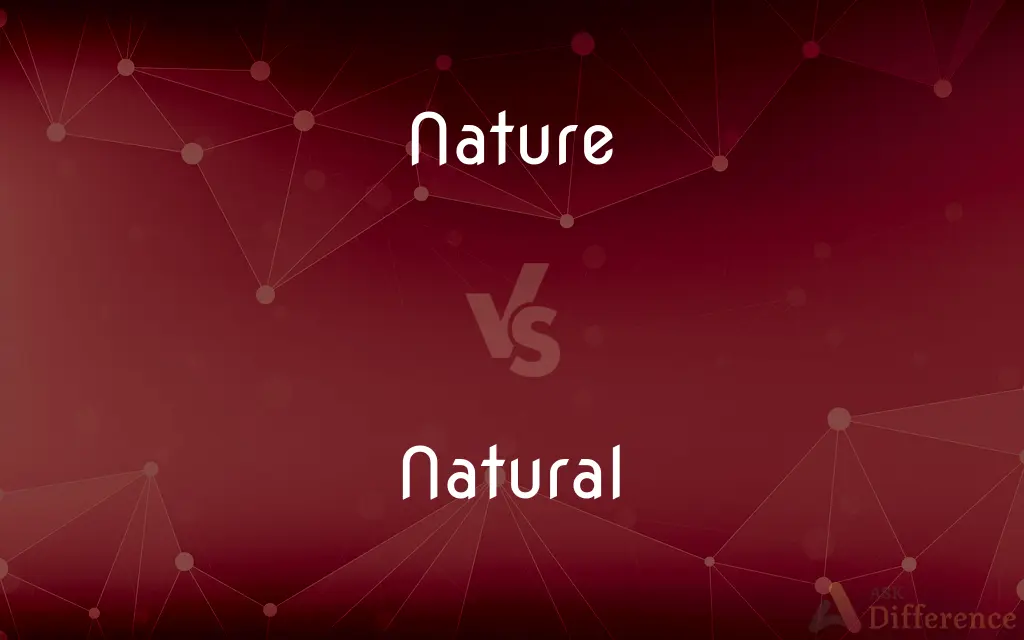Nature vs. Natural — What's the Difference?
By Maham Liaqat & Fiza Rafique — Updated on March 4, 2024
Nature refers to the physical world and its phenomena, untouched by human hands, while natural denotes qualities or characteristics inherent or in accordance with nature.

Difference Between Nature and Natural
Table of Contents
ADVERTISEMENT
Key Differences
Nature encompasses the entirety of the physical world, including plants, animals, landscapes, and other features and products of the earth that are not altered by human intervention. It is often considered in terms of the beauty, power, and complexity of the earth and its ecosystems. On the other hand, natural describes attributes or phenomena that exist or happen by nature, without artificial influence. It implies being in accordance with the inherent qualities or principles of nature, often used to describe substances, processes, or behaviors.
When discussing environmental conservation, 'nature' refers to ecosystems, biodiversity, and the physical environments that conservation efforts aim to protect. 'Natural,' in this context, might describe the methods or resources that are in harmony with ecological processes, emphasizing sustainability and minimal human impact. For example, natural farming practices seek to work within the bounds of nature rather than imposing harmful artificial systems.
The context of products, such as foods or cosmetics, 'natural' is often used to indicate that the products are made from ingredients sourced from nature, without synthetic additives. This contrasts with 'nature,' which does not directly apply to products but rather to the source of these ingredients, such as plants or minerals found in the natural environment.
Philosophically, 'nature' can refer to the essence of the universe and the natural order of things, encompassing laws of physics, natural selection, and geological processes. 'Natural,' however, is used to denote what is considered normal or expected within this order, such as natural behavior or natural rights, implying an inherent or fundamental quality that does not require human intervention to exist or be understood.
'Nature' is a theme that represents the physical world or life in its untouched state, inspiring awe or reflection. 'Natural,' by contrast, might describe the style or technique that seeks to mimic or evoke the simplicity, beauty, and authenticity of nature, aiming for a representation that feels true to life and uncontrived.
ADVERTISEMENT
Comparison Chart
Definition
The physical world and its phenomena, untouched by humans.
Qualities or characteristics inherent or in accordance with nature.
Context
Environmental conservation, ecosystems, physical environments
Methods, products, behaviors in harmony with ecological processes
Usage in Products
Source of ingredients (plants, minerals)
Made without synthetic additives, implies purity
Philosophical Use
Essence and natural order of the universe
Normal or expected within the natural order, fundamental qualities
In Literature/Art
Theme representing the untouched physical world
Style or technique that mimics the simplicity and beauty of nature
Compare with Definitions
Nature
Features and phenomena of the earth.
The documentary explored the wonders of nature, from oceans to mountains.
Natural
In accordance with nature's principles.
Natural selection plays a crucial role in evolution.
Nature
A theme in art and literature.
His paintings capture the serene and wild aspects of nature.
Natural
Mimicking the simplicity of nature.
The architect's design was praised for its natural light and materials.
Nature
The entirety of the physical world.
Nature's beauty is unparalleled in its diversity and complexity.
Natural
Free from artificial additives.
Consumers are demanding more natural ingredients in their food.
Nature
The inherent force controlling the natural world.
Nature has a way of restoring balance after disturbances.
Natural
Existing in or derived from nature.
She prefers using natural remedies over synthetic medicines.
Nature
The natural world as affected by human activity.
Conservation efforts aim to protect nature from further degradation.
Natural
Inherent qualities or behaviors.
It's natural for young animals to play as part of their development.
Nature
Nature, in the broadest sense, is the natural, physical, material world or universe. "Nature" can refer to the phenomena of the physical world, and also to life in general.
Natural
Present in or produced by nature
A natural pearl.
Nature
The phenomena of the physical world collectively, including plants, animals, the landscape, and other features and products of the earth, as opposed to humans or human creations
The breathtaking beauty of nature
Natural
Not acquired; inherent
Love of power is natural to some people.
Nature
The basic or inherent features, character, or qualities of something
Helping them to realize the nature of their problems
There are a lot of other documents of that nature
Natural
Functioning or occurring in a normal way; lacking abnormalities or deficiencies;
It's the natural thing to happen
Natural immunity
A grandparent's natural affection for a grandchild
Nature
The natural physical world including plants and animals and landscapes etc.;
They tried to preserve nature as they found it
Natural
Unaffected and natural looking;
A lifelike pose
A natural reaction
Nature
A particular type of thing;
Problems of this type are very difficult to solve
He's interested in trains and things of that nature
Matters of a personal nature
Common Curiosities
What defines something as natural?
Something is defined as natural if it exists in or is caused by nature without human intervention.
What is the significance of preserving nature?
Preserving nature is crucial for maintaining biodiversity, ensuring sustainable resources for future generations, and protecting ecological balance.
How does nature impact human life?
Nature impacts human life by providing essential resources, regulating climate, and offering mental and physical health benefits.
Can human-made objects be considered natural?
Human-made objects are generally not considered natural because they involve artificial processes and materials.
What is the difference between natural and organic products?
Natural products are derived from nature without synthetic additives, while organic products meet specific standards of production, including no synthetic pesticides or fertilizers.
How do natural disasters fit into the concept of nature?
Natural disasters are part of nature's dynamic systems, resulting from the earth's natural processes, such as weather patterns and geological movements.
Why do people seek natural products?
People seek natural products for their perceived health benefits, environmental sustainability, and to avoid synthetic chemicals.
How does the concept of natural rights relate to nature?
Natural rights are based on the idea that certain rights are inherent and universal, grounded in human nature and the natural order, rather than bestowed by society.
How is the balance of nature maintained?
The balance of nature is maintained through ecological processes, including predator-prey relationships, nutrient cycling, and natural selection.
Can technology be used to preserve nature?
Yes, technology can be used for conservation efforts, monitoring ecosystems, and reducing human impact on the environment.
Can something be natural but not beneficial to humans?
Yes, many natural substances or phenomena can be harmful or toxic to humans, illustrating that natural does not always mean safe or beneficial.
What role does nature play in mental health?
Nature plays a significant role in improving mental health by reducing stress, enhancing mood, and providing a sense of peace and well-being.
How do natural phenomena influence culture and art?
Natural phenomena have profoundly influenced culture and art, inspiring creativity, spiritual beliefs, and artistic representations across civilizations.
How does the study of nature contribute to scientific knowledge?
The study of nature contributes to scientific knowledge by revealing the laws and processes that govern the natural world, informing everything from ecology to medicine.
What challenges does nature face today?
Nature faces challenges such as climate change, habitat destruction, pollution, and biodiversity loss due to human activities.
Share Your Discovery

Previous Comparison
Stomach vs. Belly
Next Comparison
Task vs. QuestionAuthor Spotlight
Written by
Maham LiaqatCo-written by
Fiza RafiqueFiza Rafique is a skilled content writer at AskDifference.com, where she meticulously refines and enhances written pieces. Drawing from her vast editorial expertise, Fiza ensures clarity, accuracy, and precision in every article. Passionate about language, she continually seeks to elevate the quality of content for readers worldwide.














































